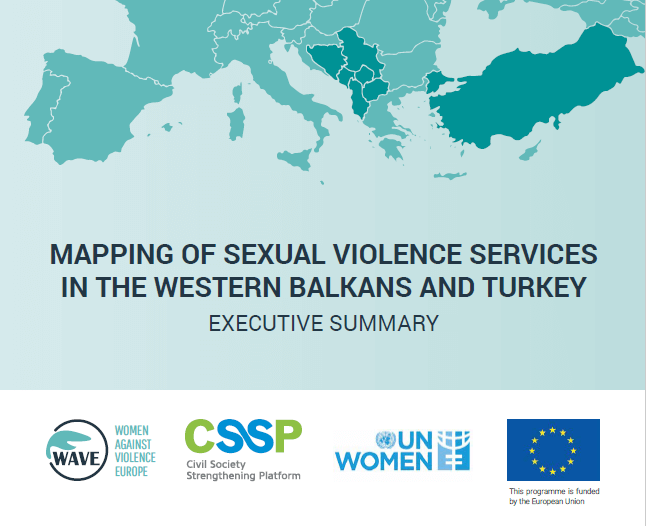December 9th, 2019 – The ‘Mapping on sexual violence services in the Western Balkans and Turkey’ Executive summary aims at providing an overview of the services specifically supporting victims of sexual violence in Albania, Bosnia and Herzegovina, Kosovo, Montenegro, North Macedonia, Serbia and Turkey.
International legislation calls for adequate support services for victims of sexual violence. Article 25 of the Council of Europe Convention on preventing and combating violence against women and domestic violence (also known as the Istanbul Convention) is entirely dedicated to ensuring that states provide adequate support for victims of sexual violence and calls upon states to ensure that these services are set up and easily accessible for victims of sexual violence.
Furthermore, the Explanatory Report of the Istanbul Convention acknowledges that since sexual violence is especially traumatizing, it requires a particularly sensitive response by trained and specialized staff. Throughout the implementation of the CSSP project in frame of the EU/UN Women programme: “Implementing norms, changing minds”, all partners in the Western Balkans and Turkey identified the lack or only rudimentary provision of specialist sexual violence services in the region.
Moreover, there is no holistic data collection about the number of support services working with victims of sexual violence nor the type of institutions that might be providing these services. Therefore, the mapping report provides an overview of the number of support services specifically for victims of sexual violence in the countries, assesses who provides these services, what kind of services are available and where they are located. The present report is a joint effort between the WAVE office, all nine project partners and consultants who were tasked with interviewing different women’s NGOs and national stakeholders in all seven countries.
Only three countries (Albania, North Macedonia and Serbia) out of seven have established specific services supporting victims of sexual violence, while four countries (Bosnia and Herzegovina, Kosovo, Montenegro and Turkey) out of seven have some or no specific services established for victims of sexual violence. There is a clear absence of services exclusively supporting victims of sexual violence in Bosnia and Herzegovina and Kosovo. Victims of sexual violence are supported mainly by women’s NGOs/state institutions running domestic violence shelters, counselling centres or helplines. In Montenegro there is one support line for survivors of sexual violence established by the women’s NGO Montenegrin Women’s Lobby. Turkey has the Children Monitoring Centres, which exclusively support children and the Support Units against Sexual Abuse and Assault established in universities. Even though the majority of respondents have not been able to identify support services exclusively supporting victims of sexual violence (even in countries where these services do exist), respondents identified women’s NGOs (working with victims of violence in general) and state institutions (hospitals, police stations and social centres) as the main providers for these type of services.
Lastly, the report also identified the increased need to supply capacity building and systematic training to all parties involved in supporting victims of sexual violence. Patriarchy, gender stereotypes and traditional values were also identified as significant obstacles in addressing the issue of sexual violence, along with stigma and the unwillingness of victims to report the violence.
To read the full summary, click here.
To learn more about the Civil Society Strengthening Platform (CSSP), click here.













